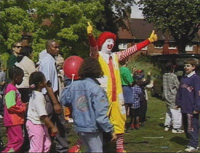Last weekend I attended the Hazel Wolf Environmental Film festival in Leavenworth, WA, where 50 films were screened. As a board member and workshop presenter, I didn’t get to see all the films I would have liked, but I was fortunate enough to see two of the headliners.
Buyer Be Fair
 Friday evening, after a presentation by the world’s first “standup economist,” Yoram Bauman, festival attendees got a sneak preview of Buyer Be Fair: The Promise of Product Certification, co-produced, written, and directed by one of the film festival’s founders, John de Graaf, along with co-producer and researcher Hana Jindrova. Chris Palmer, wildlife filmmaker and director of the Center for Environmental Filmmaking, was the film’s executive producer. The one-hour documentary on fair-trade coffee and certified wood aired on KCTS/Seattle last night and will hopefully be shown on PBS stations across the country. Here’s the synopsis from the film’s website:
Friday evening, after a presentation by the world’s first “standup economist,” Yoram Bauman, festival attendees got a sneak preview of Buyer Be Fair: The Promise of Product Certification, co-produced, written, and directed by one of the film festival’s founders, John de Graaf, along with co-producer and researcher Hana Jindrova. Chris Palmer, wildlife filmmaker and director of the Center for Environmental Filmmaking, was the film’s executive producer. The one-hour documentary on fair-trade coffee and certified wood aired on KCTS/Seattle last night and will hopefully be shown on PBS stations across the country. Here’s the synopsis from the film’s website:
BUYER BE FAIR: THE PROMISE OF PRODUCT CERTIFICATION takes viewers to Mexico, the Netherlands, the UK, Sweden, the USA and Canada to explore how conscious consumers and businesses can use the market to promote social justice and environmental sustainability through product labeling, with a focus on Fair Trade coffee and Forest Stewardship Council certified wood. BUYER BE FAIR is an inspirational and balanced television special that reaches beyond the choir to present the promise of product certification to a wide audience.
…
BUYER BE FAIR looks at two major trade goods-timber and coffee-to understand how certification works and whether it works. We take viewers to isolated Indian villages in the state of Oaxaca, Mexico, where some of the answers emerge. In Santa Catarina Ixtepeji, a community’s timber is certified by the Forest Stewardship Council (FSC) as produced in a just and sustainable manner. In the villages that are members of Cooperativa La Trinidad, Fair Trade, Shade-Grown, Organic coffee is produced and finds a growing market in the US. We see how these communities are benefiting from certification and what the obstacles are to broadening its scope.
Head on over to the website to watch clips from the film and learn about certification. While you browse, you can also see how many football fields of forest have been destroyed. Sigh.
Update [2006-3-31 11:55:45 by Chris Schults]: Buyer Be Fair will also air on KCTS on April 2nd and 3rd.
McLibel
 On Saturday night, the feature presentation was McLibel, which documents the seven-year legal battle between two U.K. activists and McDonalds. You know you’re in trouble when they send in Ronald McDonald.
On Saturday night, the feature presentation was McLibel, which documents the seven-year legal battle between two U.K. activists and McDonalds. You know you’re in trouble when they send in Ronald McDonald.
McLibel is the true story of a postman and a gardener who took on McDonald’s and wouldn’t say “McSorry,” in a legal battle since described as “the biggest corporate PR disaster in history.”
McDonald’s loved using the UK’s libel laws to suppress criticism. Major media organizations like the BBC and The Sun had crumbled and apologized. But then McDonald’s sued penniless activists’ Helen Steel and Dave Morris.
In what became the longest trial in English legal history, the “McLibel 2” represented themselves against McDonald’s USD$19 million legal team.
…
McDonald’s tried every trick in the book against them. Legal maneuvers. A visit from Ronald McDonald. Top U.S.executives flying to London for secret settlement negotiations. Even spies.
Seven years later, in February 2005, the marathon legal battle finally concluded in the European Court of Human Rights. And the result took everyone by surprise – especially the British Government.
…
McLibel is not about hamburgers. It is about the power multinational corporations wield over our everyday lives and two unlikely heroes who are changing McWorld.
Over at McSpotlight.org, you can learn about the environmental issues involved in the case.

